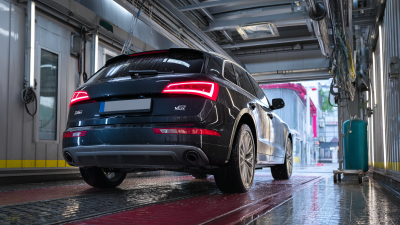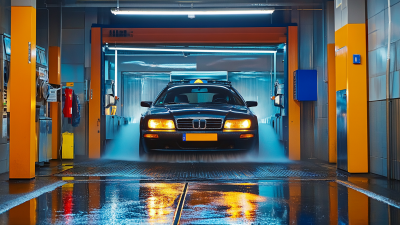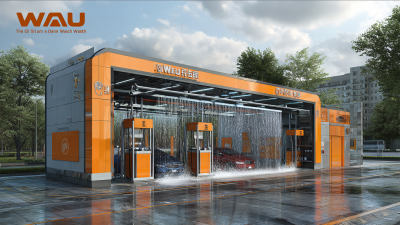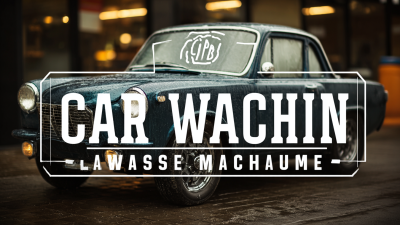Why an Automatic Carwash Machine is the Future of Convenient Vehicle Care
As the automotive care industry evolves, the emergence of the Automatic Carwash Machine stands out as a game-changer in vehicle maintenance. Recent industry reports indicate that automated carwashing systems are projected to grow at a CAGR of 4.5% over the next five years, reflecting a growing consumer preference for convenient and efficient services. With time constraints becoming a significant factor in modern life, the automatic carwash offers a solution that not only saves time but also delivers consistent results while using eco-friendly techniques. Moreover, statistics reveal that 70% of car owners prioritize convenience when selecting a car wash, showcasing a clear market trend towards automated solutions. This shift makes the Automatic Carwash Machine not just a trend, but a necessity in our fast-paced world, paving the way for a future where vehicle care is seamless and accessible to all.

The Rise of Automatic Carwash Machines in the Vehicle Care Industry
The vehicle care industry is witnessing a significant transformation with the rise of automatic carwash machines. As consumer preferences evolve towards convenience and efficiency, these machines are rapidly becoming a preferred choice for car owners. The surge in the global car wash service market, projected to grow from USD 41.2 billion in 2025 to USD 69.7 billion by 2033, underscores the increasing demand for automated solutions. This trend can be attributed to the advancements in technology, particularly in sensors, which enhance the efficacy and user experience of automatic carwash systems.
Tips: When using an automatic carwash, make sure to remove any loose items from your vehicle and check for any potential obstacles, such as antennas or roof racks, to prevent damage during the wash process. Additionally, consider researching local carwash services that utilize environmentally friendly cleaning products to support sustainability while maintaining your car's appearance.
The integration of AI in automotive applications also plays a crucial role in this evolution. From intelligent maintenance alerts to personalized in-car solutions, AI is redefining how services interact with users. Automatic carwash machines are increasingly adopting smart technologies that not only ensure a thorough clean but also provide real-time feedback and optimization of cleaning methods based on the vehicle's condition.
Tips: To maximize your automatic carwash experience, schedule regular washes to maintain your vehicle's finish and protect it from potential damage caused by dirt and grime buildup. Furthermore, be sure to choose a carwash that offers customizable options, allowing you to select the appropriate wash package for your vehicle's needs.
Key Advantages of Automatic Carwash Machines Over Traditional Hand Washing
The convenience and efficiency of automatic carwash machines have dramatically transformed vehicle care, offering several key advantages over traditional hand washing. According to a recent report by IBISWorld, the automatic carwash industry has seen a significant growth of about 4.5% annually, highlighting a shift in consumer preference towards quicker and more efficient services. This evolution is driven by the time-saving aspect that automatic carwash machines provide, allowing customers to get their vehicles cleaned in just a few minutes, as opposed to the lengthy process of hand washing which can take considerably longer.
Moreover, automatic carwash machines are engineered to provide a more uniform cleaning experience. The equipment utilizes advanced technology such as foam brushes and high-pressure rinse systems, ensuring that dirt and grime are effectively removed without the risk of scratching the vehicle's surface. A study by the International Carwash Association found that automatic washes can use up to 80% less water compared to traditional washing methods, making them not only eco-friendly but also compliant with growing water conservation regulations. This blend of efficiency, safety, and environmental consideration positions automatic carwash machines as the future of convenient vehicle care.
Industry Statistics: The Growth of Automated Car Wash Facilities in Recent Years
The rise of automatic carwash machines reflects a significant shift in vehicle care preferences, driven by convenience and efficiency. According to the International Carwash Association, the automatic car wash industry has seen a steady growth rate of approximately 4.8% annually over the past five years. In 2022 alone, the U.S. market generated over $12 billion in revenue, highlighting a strong consumer inclination towards automated solutions that save time and effort.
As urban populations continue to grow, the demand for quick and accessible vehicle care options has never been higher. The National Association of Car Care Professionals reports that over 70% of car owners prefer automatic washes due to their speed and thoroughness. Furthermore, the installation of new facilities has surged, with a marked increase in express and multi-service car washes that can service hundreds of vehicles daily. This trend indicates not only a shift in consumer behavior but also the industry's adaptation to meet the changing demands of an increasingly busy society.

Technological Innovations Driving the Future of Automatic Carwash Solutions
The automobile industry is witnessing a significant transformation, driven by technological innovations that are redefining vehicle care. According to a report by IBISWorld, the automatic carwash market is expected to reach $12 billion by 2025, highlighting the increasing consumer preference for convenience and efficiency in vehicle maintenance. Innovations such as touchless wash technology and advanced water reclamation systems are making automatic carwashes not only faster but also more environmentally friendly, addressing growing concerns over water usage and runoff pollution.
Furthermore, artificial intelligence and machine learning are enhancing the performance of automatic carwash machines. These technologies allow for better customization of wash cycles based on vehicle type and level of dirt, optimizing water and soap usage to provide superior cleaning results. A report from Grand View Research indicates that automated carwash systems are projected to grow at a compound annual growth rate (CAGR) of 4.6% over the next five years. This growth signals a strong market shift towards automated solutions, driven by a demand for consistent quality and reliability in vehicle care that aligns with modern customers' busy lifestyles.
Why an Automatic Carwash Machine is the Future of Convenient Vehicle Care - Technological Innovations Driving the Future of Automatic Carwash Solutions
| Feature | Description | Benefits | Technological Innovation |
|---|---|---|---|
| Mobile App Integration | Users can schedule washes and make payments through a mobile app. | Convenience, easy access to services, and time savings. | Cloud Computing, Mobile Technology |
| Automated Payment Systems | Contactless payments through RFID or mobile pay options. | Speed, safety, and enhanced user experience. | NFC, RFID Technology |
| Eco-Friendly Cleaning Solutions | Use of biodegradable detergents and water recycling systems. | Sustainability and compliance with environmental regulations. | Water Recycling Technology, Biodegradable Chemicals |
| AI-Powered Service Customization | Systems adapt wash options based on vehicle type and condition. | Personalized service, improved cleaning effectiveness. | Artificial Intelligence, Machine Learning |
| Real-Time Performance Monitoring | Systems monitor their own performance and maintenance needs. | Reduced downtime and increased reliability. | IoT, Predictive Analytics |
Consumer Trends: How Convenience is Shaping Car Care Preferences Today
The current landscape of vehicle care is increasingly shaped by
consumer preferences for convenience, a trend that has gained momentum in recent years.
As the car care products market continues to grow—valued at
$13.00 billion in 2024 and projected to reach
$17.02 billion by 2032—automated solutions
such as carwash machines are becoming essential for meeting the evolving needs of busy car owners.
This shift emphasizes the demand for quick and efficient services, enabling consumers to seamlessly
integrate vehicle maintenance into their hectic schedules.
In tandem with these preferences, the car wash market is also experiencing significant growth, with projections indicating that
its size could climb to $68.9 billion by 2031.
This growth underscores the importance of convenience not just for consumers but also for service stations and
businesses aiming to thrive in the competitive landscape. By adapting to these consumer trends and investing in
automated services, companies can enhance their offerings, ultimately satisfying the modern customer's desire for
flexible and time-saving solutions in car care.

Related Posts
-

Navigating Industry Standards and Challenges in the Best Car Wash Machine Production
-

5 Essential Tips to Optimize Your Machine Car Wash Business for Global Buyers
-

7 Best Practices for Choosing Automatic Carwash Equipment
-

Ultimate Guide to Choosing the Best Automatic Car Wash Equipment for Your Business
-

Unmatched Quality: China’s Top Drive Through Car Wash Machines for Global Buyers
-

7 Essential Tips for Choosing the Best Car Wash Machine Equipment for Your Business